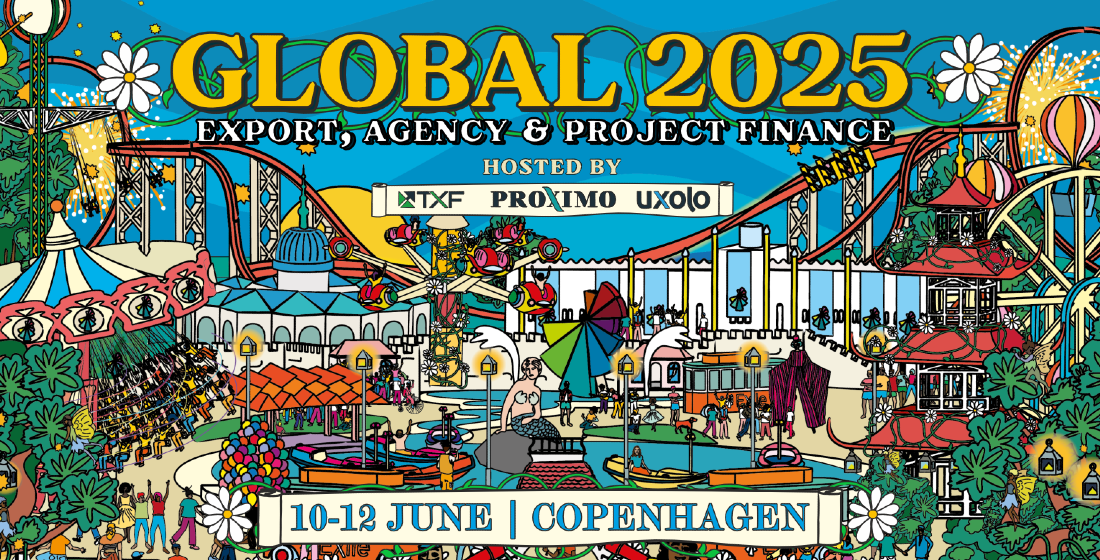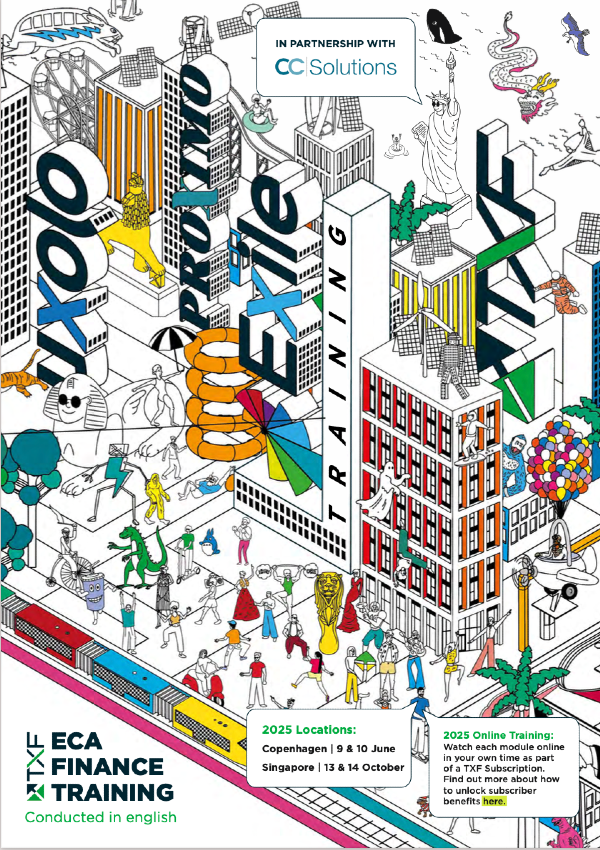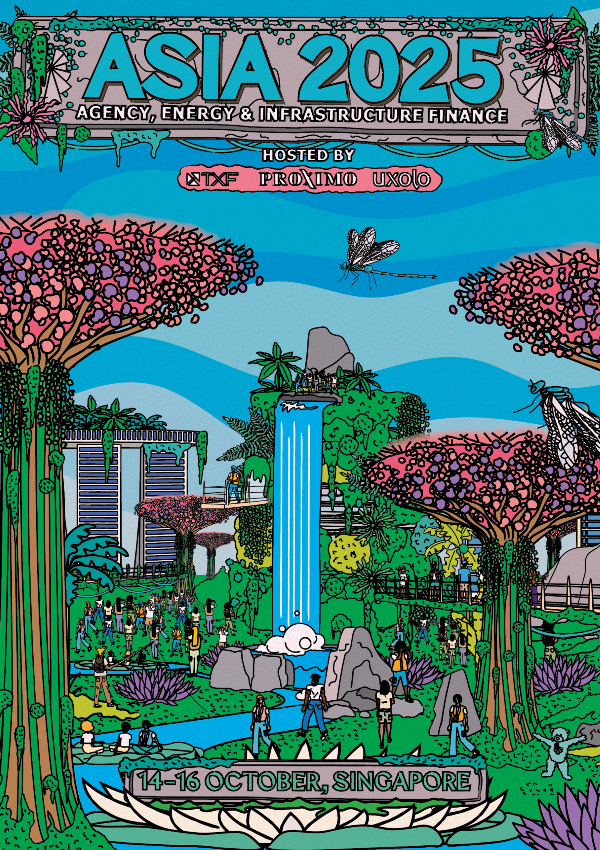Keynote: Meet Mairead Lavery, EDC’s positive philosopher
TXF finds Mairead Lavery full of vigour about her first year as president and CEO of EDC in advance of her first performance review with the chair of the board. Her energies are devoted to promoting Canadian exporting companies on a path to sustainability, inclusion and diversity. Is she concerned about EDC’s perception as being more a bank than a traditional ECA? Not a bit of it. What about local content requirements? Competition with other ECAs? It’s a question of philosophy.
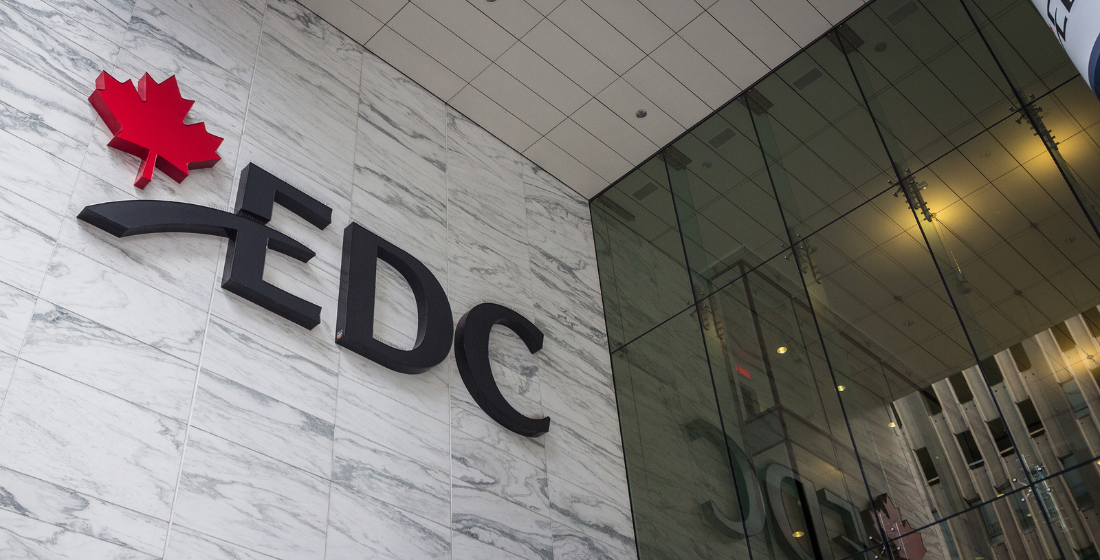
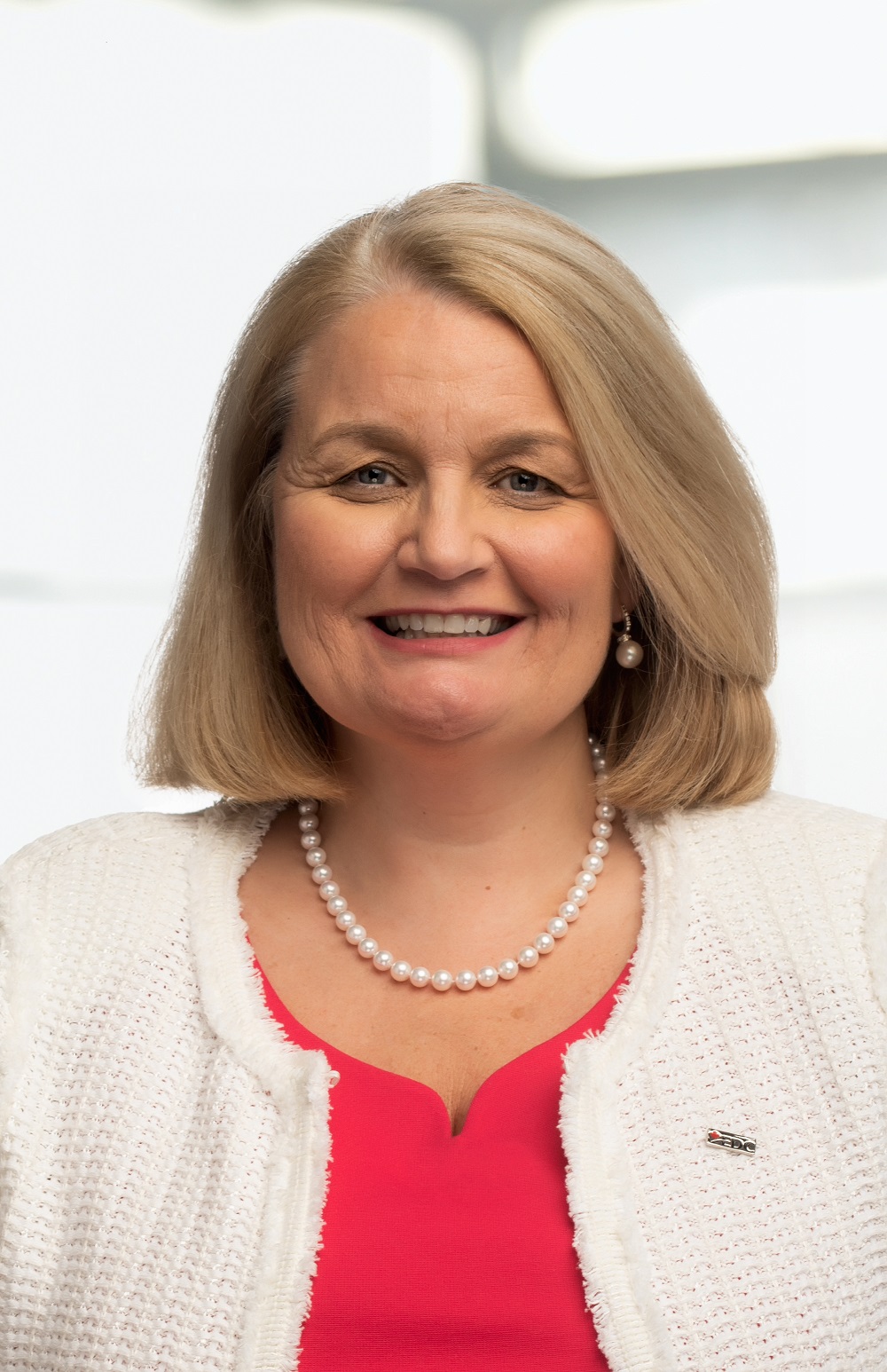 TXF: How's the year been for EDC and for you in particular as your first year as CEO?
TXF: How's the year been for EDC and for you in particular as your first year as CEO?
Mairead Lavery (ML): I’m very happy with the business side as we’ve increased our effect for Canadian companies and when we help them on their growth journey, we help Canadian trade, which is always very exciting. We've now got over 17,000 customers. And it’s been a great year for our employees. For the 10th year in a row we're one of Canada's top 100 employers. We’re investing more in diversity and inclusion and the things that matter to our employees in their daily lives around becoming more green and sustainable – even swapping our cutlery from plastic to metal.
I'm particularly focused on diversity and inclusion. And last year we amped that up with more support for our LGBTQ+ employees and a real focus on wellness. So I would say our employees are dealing with a change of a new president and enjoying some of the areas of focus that I have.
Last year was an important one for our partners. We work very collaboratively with them to ensure that we're not distorting the market. The most important partner for us is our banking community. And last year we launched a number of new products with our banks that I’m excited about and that will allow us to reach more small business owners. We had a number of collaborations, including one that was one of the biggest incubators in Canada, which is the MaRS Discovery District. We can get people thinking about going global right from the start of their entrepreneurial journey. I’m very excited about our ability to do that.
I’m amplifying our work with women entrepreneurs and we announced (in 2018) we wanted to facilitate C$250 million in support for them. We'll end in 2019 north of C$600 million, so that’s an incredible achievement. Last year we also announced our Women in Trade Investments Program which invests in women-owned companies and in funds that are focused on helping women entrepreneurs. We got great traction on that last year.
We launched our activity with respect to indigenous exporters. We wanted to build on the learnings that we had with our women entrepreneur programme to see what we can do additionally for indigenous exporters to help the indigenous community. We also activated some additional work with respect to LGBTQ+ exporters. We’re targeting specific types of customers that have particular common interests to make sure that we're really meeting their needs.
TXF: You mentioned not crowding out other players as well. One thing that is often said about EDC is that it operates more like a bank than an ECA from an external perspective. We've seen some quite interesting deals come through with you with Java 3 still in process, some Australian deals (like Wellington Solar) last year. How you do you go about not crowding out commercial players?
ML: Taking it from the small business angle first, we're really trying to work out where companies are on their growth journey and whether exporting is part of that growth. We're trying to work with the existing financial partners to encourage them, to derisk it, to actually help build the market. A lot of Canadian banks don't have as much experience of underwriting internationally. They don't have as big an international footprint. Therefore, it's really important that we work with them so that they can help their small companies and encourage them to export.
Some of it is knowledge sharing, some of is derisking where we have a guarantee product that actually allows the bank to derisk their support for working capital for our exporters.
In the larger business community, as you can imagine, the large multinationals and of course, you mentioned some very large significant deals, there our companies and our banks are much more familiar with us stepping in around the world. We have one of the largest project finance teams in the world and we will generally take a lead role in arranging those transactions.
Canadian banks don't necessarily play in that space. So, again, we're stepping in to fill a market gap. Within Canada and all the rest of the business, it's very much staying close to the banks, ensuring that we're always on market terms. It's always on commercial terms, and working with them to step in when there isn’t capacity or when there is a particular challenge in a sector or an industry.
TXF: Do you have specific examples of that?
ML: One would be in oil and gas. When we started to see falling oil prices, that had a significant effect on Canada because there's a lot of oil and gas-linked companies in Canada and we are a resource-based community. We would step in to ensure that Canada can maintain its exporting position because the banks’ risk appetite may reduce in that situation. It’s not something that’s fixed but we continue to work with our banking partners and to monitor the market to flex as to where we are needed at a point in time.
TXF: How flexible is EDC in its local content requirements for supporting the international deals you do and how does it compare with other OECD countries?
ML: There's actually a difference across the OECD countries and certainly in the non-OECD countries. EDC’s vision, or philosophy, which is the word I would like to use, is about ensuring that Canadian companies have a level playing field and we have a mandate to support and develop Canada's trade positions. Today’s companies don’t just trade the way they used to, ie a factory in Canada supplying wood somewhere around the world. That's a very traditional view of exporting.
Today, companies all around the world are delivering products from locations all around the world with factories in different locations and jurisdictions. Often they work with partners or through joint ventures. They may be just part of a very complex international supply chain and also engaging in e-commerce or are providing a service rather than a product. So it's not the traditional idea of viewing content created in a country because it comes from a factory in Canada and is dispatched on a ship to another country. EDC believes in keeping in touch with that. And we certainly support an integrated trade model.
Of course, we do look at content but our actual test is are there benefits coming to Canada from the trade activity that a Canadian company is engaging with. Whether that's through their factory in Asia, through a joint venture that they have in the Middle East or because they are they're supplying goods as part of an international supply chain. We take a very holistic view and then review the benefits that come to Canada. So how much trade does that generate for Canada, do their head offices exist in Canada, how are their affiliates doing around the world.
Some other ECAs are moving this way, some are already there and they have a benefit calculation as well, and others still remain with a content definition for their support.
TXF: How do you view the competitive landscape and how you position yourself with other ECAs?
ML: I don't see it as about being about competition at all. It's actually making sure that we're supporting our Canadian companies and ensuring a level playing field. From my perspective I think about partnership, I think about collaboration and I think about multilateralism and a multilateral rules-based system.
So when I think about ECAs working in partnership it’s around support for OECD or WTO, trying to enhance and modernise rules. It's about sharing best practice and it's about taking on issues that are bigger than any one country or ECA. A good example of that is climate change, which is affecting all of us.
It’s an opportunity. It’s not competitive because when I look at what it takes today to do some of these really large projects around the world, it is companies coming from all countries with all different experiences. I need the ability to partner with other ECAs to deliver some of these outcomes for Canadian companies.
It is by partnership, sharing best practice, learning from each other and continuing to work on upgrading the rules for the way trade is done today.
TXF: Are there particular other ECA’s that you see having a similar mindset to you?
ML: I'm supporting Canada's efforts at the OECD, G7, G20 Berne Union, many of these different forums and there are many discussions about how non-OECD ECAs conduct their business.
China is also often referred to. We look at innovations in non-OECD ECAs and the sorts of products and programmes out there and how we can ensure Canadian companies have similar support.
Within the OECD it varies. There are some ECA products and programmes following the way trade is done today. Italy’s ECA [SACE] does a number of things that are very similar to EDC. Perhaps we may have been doing them for longer and there's a scale component to that.
The US has a very different model than EDC. It’s very important as it’s a major partner and we spend a lot of time looking at the countries that Canada does a lot of trade with, the UK, the US and China. These are countries that are very important that we understand how trade is done because they are Canada's largest trading partners.
TXF: How is EDC responding to current geopolitical changes?
ML: Our wonderful economic team provides us, and Canadian companies, with a lot of intelligence and not just internally at EDC, but even they can’t always predict what’s happening, say, with Iran. It makes it difficult for Canadian companies who are looking to invest abroad providing product or services.
I have one shareholder, the Government of Canada, and we're working very closely with our global affairs department. We receive their advice on what they're seeing first-hand on the ground and provide them intelligence from our own companies. It’s a two-way exchange.
The most important thing that we do is remain very long-term focused and very patient because we have to support Canadian companies…and provide stability in a very uncertain market.
TXF: Of the key deals that you've got in the pipeline, particularly some of the long and large deals, which are you most excited by?
ML: We are involved in a lot of very large significant deals around the world. What excites me the most at the moment is being at this point of time where people are understanding responsible and sustainable business. That’s the most important thing. It’s not actually my products per se, it’s more how can I help Canadian companies understand what's happening vis-a-vis climate change, human rights, business integrity around the world and helping them manage the risk of doing business internationally.
In terms of climate, for example, we are helping companies understand the risks to their own business and the effect they have on the climate. EDC took the opportunity in 2019 to sign up for the Task Force on Climate-related Financial Disclosure and we issued our policy on climate change.
Our work with oil and gas companies is a good example in Canada to talk about the transition to a low carbon economy and to match that with products and services we have in clean technology. That way not only are we saying there’s a need to change and a risk if you don’t change, but actually bringing to the table some solutions to them around clean technology companies that Canada has and what additional visibility and support we can give as it relates to clean technology. I see this as a responsible and sustainable business environment.
You talk about long and large deals – we’ve been doing very significant assessments in human rights and in 2019 we became the we became the first Canadian financial institution to issue its own standalone human rights policy. There’s the chance to help our companies by leading them through these challenges on long and large deals to consider biodiversity, business integrity in general, the effect on people and to ensure that all of those things are considered to build a sustainable future for us all.
It's been very challenging in the trade finance world with the level of regulation on anti-money laundering and KYC. Ensuring we can translate that for all companies that we work with and either use our leverage to do things differently in all of those categories of responsible and sustainable business and help our companies through this really significant shift that is happening in the world, in the finance industry and in trade in general really excites me.
TXF: You also work with Canada’s new DFI, FinDev Canada, how is that going and how is it helping close the trade finance gap?
ML: FinDev Canada is a wholly owned subsidiary of EDC and it’s Canada’s development finance institution (and I'm the chair of the board). Last year was its first full year of operation and it was specifically set up to address three of the SDGs –women's economic empowerment, climate action and market development. So when we talk about the trade finance gap, it’s very clearly focused on three of the SDGs and on two geographical areas, Africa and Latin America.
And that level of focus is extremely important because it is a very large trade finance gap. And as much as we work on it commercially with SMEs, women or exploring digital finance, etc., we equally need to reflected in development and in some of the developing countries. I'm very excited about that subsidiary. They do lending and investing and have had success last year in terms of mobilising private capital and additional capital to support, particularly women, entrepreneurs in Africa via 2X Challenge Group.
I have a commercial business that's a more traditional in EDC, although I don't often think of EDC as a traditional ECA, then you have this development finance institution in Canada, so we’re focused on what we can do in Canada and internationally.
TXF: How do you see the strategy for EDC going forward?
ML: I've talked about a different number of issues we're very focused on. We’re very happy this year to have celebrated our 75th anniversary back in November. We're quite excited that we are 75 years old and we will continue to do what we've been doing, which is first and foremost focus on what is it that Canadian companies need. That's the most important thing, it's about Canadian companies and about helping Canada and its trade position and the way that we will translate that focus on Canadian company if they continue to innovate in our products, our processes, the way in which we can continue to do business. And I really see collaboration and partnerships as being a very large part of that going forward.
One of the things that's equally part of our strategy is digital enablement and engagements with Canadian companies and international companies and digital enablement, meaning enabling my team to actually do more and provide a better customer experience in working with an ECA. We continue to focus on some of the under-represented groups in trade: women entrepreneurs, indigenous entrepreneurs, LGBTQ+ entrepreneurs, even geographically different regions that might need a different focus. Finally, just seizing the opportunity that's in front of Canada in trade, such as Free Trade Agreements and particular trading relationships.
On a more personal note, I'm thrilled with how year one has gone. It's been extremely busy but very rewarding. I started the year with three clear areas of focus: vision, visibility and organisation. In that order, vision is about ensuring the business strategy takes us through the next decade and helping Canadian companies and really delivering on the mandate that we've been given. Visibility - we want Canadian companies to understand that we are here for them and that we can help on their growth journey and that we can continue to support Canada internationally.
Like any new CEO, I arrived with some new ideas. I wanted to build my team and set the organisation up for success for the next few years and I was very focused on that in my first 90 days, and a couple of months thereafter. I am happy to say I've got an awesome team and I’m pleased I got that done very early on in my presidency, and that's really allowing me to focus on my strategy and where we go in the future. So I'm super thrilled by 2019, which I'll be telling my boss, and I am really looking forward to where we can make a difference in 2020.



